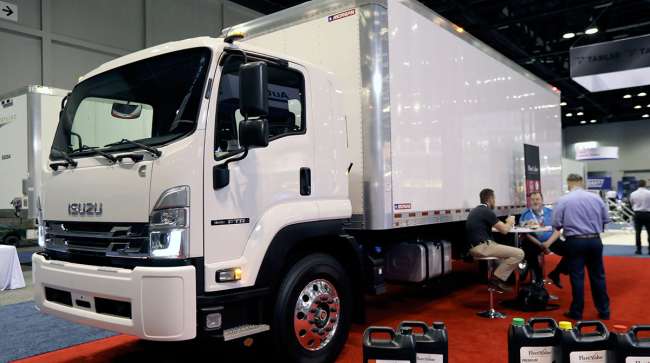An Isuzu Class 6 FTR Series truck on display at an industry trade show. (John Sommers II for Transport Topics)
Truck maker Isuzu will launch a battery-electric version of its Class 6 and Class 7 F-series medium-duty trucks in 2027, rather than 2026 as initially expected.
The powertrain for the trucks will be supplied by Cummins’ Accelera division, including the battery and 14Xe eAxle.
Potential customers will get their first glimpse of the trucks at the 2025 Advanced Clean Transportation Expo in Anaheim, Calif., at the end of April.
Details of the Classes 6-7 battery-electric trucks first emerged at the 2024 ACT Expo, when Isuzu promised a 2026 debut.
Serial production is set to begin in 2027, the partners said.
Isuzu currently offers one battery-electric truck, the Class 5 NRR-EV.

“Creating a localized supply chain and assembly capabilities adds to our ability to meet customer demand,” said Shaun Skinner, CEO of Isuzu Commercial Truck of America. (LinkedIn)
Cummins and Isuzu first teamed up on battery-electric trucks in 2019.
Isuzu said the battery-electric F-series will feature a newly designed low-cab forward chassis to enhance maneuverability.
“For our customers in the U.S. and Canada, we are very excited to expand our product offering in Class 6 and 7 to include an F-Series BEV zero-emissions truck starting in 2027 in collaboration with Accelera,” said Shaun Skinner, CEO of Isuzu Commercial Truck of America.
“This addition to Isuzu’s portfolio assists us in providing customers more options to meet their medium-duty truck needs and maximize operational efficiencies. Additionally, creating a localized supply chain and assembly capabilities adds to our ability to meet customer demand,” Skinner added.
Isuzu’s current F-Series line up comprises the diesel Class 6 FTR and Class 7 FVR trucks.
Production of the battery-electric trucks is expected to take place at an Isuzu factory currently under construction in Piedmont, S.C. Plans for the plant — Isuzu’s first in North America — were unveiled in February.
Isuzu’s plant will have a production capacity of 50,000 vehicles by 2030.
Nick Darman of Alvys discusses the evolution of transportation management systems and workflow automation, while David Bell of CloneOps.ai shares insights from the Manifest 2025 supply chain innovation conference. Tune in above or by going to RoadSigns.ttnews.com.
Initial assembly operations will begin in 2027 and expand in 2028, by which time the plant is expected to employ more than 700 people, the company said in February.
When unwrapping plans for the site, Isuzu said it intended to introduce more battery-electric trucks and produce them in South Carolina, noting that the plant would have a variable-model, variable-volume production system capable of producing both internal combustion engine vehicles and electric vehicles.
Isuzu’s existing lineup of trucks currently is manufactured in Charlotte, Mich., by contract manufacturer Builtmore Contract Manufacturing, a unit of The Shyft Group.
Ahead of Isuzu opening the South Carolina facility, Shyft Group will continue to manufacture the company’s trucks, it said Feb. 25, adding that the two companies are minded to expand their collaboration.
The companies are engaged in discussions about Shyft developing a dedicated upfit and modification center near the plant that would support Isuzu customers.

Isuzu North America will build a manufacturing facility in Piedmont, S.C. The plant will have a production capacity of 50,000 vehicles by 2030. (Image Courtesy of Collier’s International/Isuzu)
Both of Isuzu’s existing F-Series options currently are sold with a Cummins B6.7L engine as standard.
Cummins launched the Accelera zero-emission brand and division in March 2023.
But macroeconomic headwinds and slower-than-expected adoption of zero-emission technologies hurt the brand and Cummins’ bottom line.
The Columbus, Ind.-based company took a $312 million charge against earnings in the fourth quarter of 2024 after conducting a strategic review at the division. Cummins posted a $418 million profit in the three months that ended Dec. 31, compared with a $1.431 billion loss in the year-ago period after paying a $2 billion fine to settle U.S. Department of Justice charges under the Clean Air Act.
Accelera’s strategic review was undertaken due to slower-than-forecast uptake of various zero-emission technologies, including hydrogen fuel cell electric vehicles.
The division will focus instead on battery-electric vehicles, CEO Jennifer Rumsey said during a Feb. 4 call with analysts. Cummins is refocusing investments on what it deems the most promising technology paths, executives said.
“This business has all along been about being agile,” Rumsey said on the call, adding that Cummins “looked at where we see the market moving.”
The company took the charge in Q4 because it does not yet have a line of sight on when the Accelera business will break even, Chief Financial Officer Mark Smith added later in the call.







